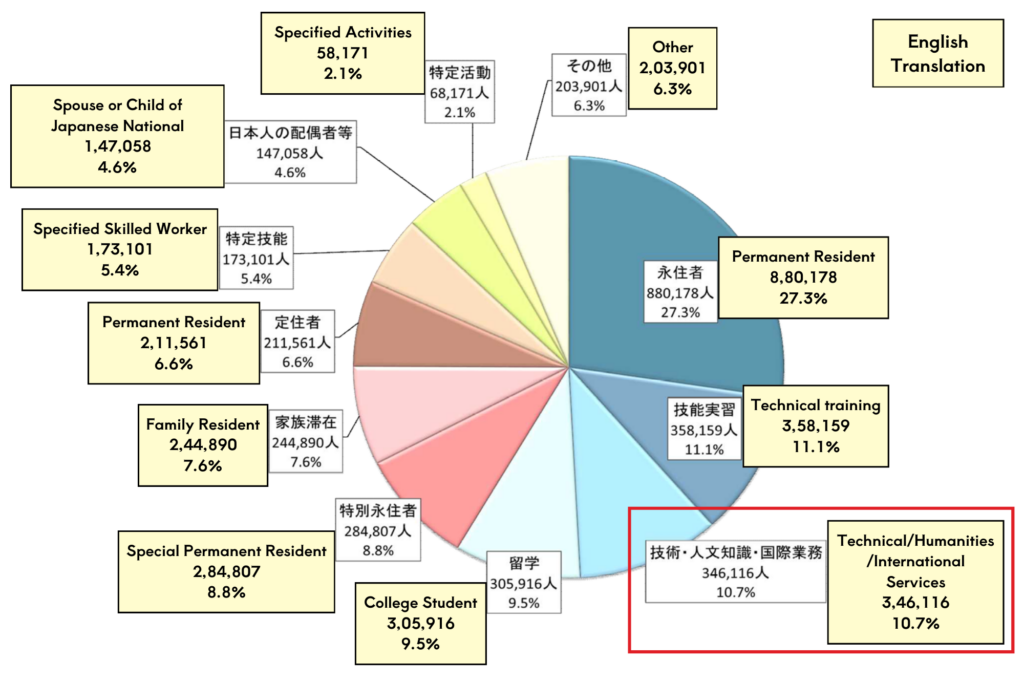Global Career Guide


- Jobs in Japan @ Daijob.com
- Global Career Guide
- Working in Japan
- Job Market Insights for Highly Skilled Professionals in Japan
Job Market Insights for Highly Skilled Professionals in Japan

Are you a skilled foreign professional looking to work in Japan? Understanding the essential requirements for high-skilled individuals like yourself is crucial. To secure employment in Japan, you must obtain a valid work visa, known as a “work-related residence status.”
Highly skilled professionals, often with advanced degrees and expertise in fields such as technology, humanities, and international business, fall under specific categories for work visas. These visas allow individuals to engage in roles that require specialized knowledge and skills.
What is Highly Skilled Personnel?

Highly skilled personnel (highly skilled foreign nationals) often refer to foreign nationals who possess advanced knowledge and language skills, typically with a background of graduating from universities or specialized schools in Japan, engaging in work that utilizes advanced knowledge and language skills. While this term may sometimes specifically refer to those holding the “Highly Skilled Professional” residency status, it commonly includes individuals holding the residency status outlined within the red border in the diagram “Composition Ratio of Resident Foreigners (by Residency Status),” particularly those with the “Technology/Humanities/International Services” residency status.
Composition of Foreign Residents by Status of Residence (as of June 30, 2023)

Types of Jobs for High-Skilled Professionals:
Let’s explore the types of occupations that individuals with the “Technology/Humanities/International Services” residency status, which is particularly prevalent among those currently residing in Japan, can work in. This residency status applies to foreign nationals engaging in tasks that require expertise in the fields of natural sciences, humanities, or tasks that necessitate a foundation in foreign cultures. These include technical roles like programmers and engineers, positions requiring humanistic knowledge like sales and marketing, and international business roles such as translation and design.
Specific Examples of Job Positions
- Technology:
- Programmers, Engineers (designers, managers, machine programmers in manufacturing, construction, etc.)
- Humanities:
- Sales, General Affairs, Finance, Public Relations, Marketing, Planning, Product Development, Consulting, etc.
- International Services:
- Interpreters, Translators, International Trade, Language Instructors, Designers, etc.

Points to Note When Working under the “Technology/Humanities/International Services” Residency Status:
While there are no limitations on the number of years you can work under this status, engaging in simple manual labor or physical work on-site is not permitted. However, as per Japanese career practices, if simple manual labor or physical work is included in practical training conducted similarly to that provided to other Japanese employees with university degrees, it is permitted. Of course, engaging in simple manual labor or physical work beyond the training period is not allowed.
Conditions for Obtaining Residency under “Technology/Humanities/International Services”
To obtain residency under the “Technology/Humanities/International Services” status in Japan, it is necessary to have a contract to work for a company (including not only for-profit organizations but also non-profit organizations) located in Japan, whether as a legal entity or as an individual entrepreneur, with the premise of performing duties.
- Have you graduated from a university in Japan or abroad, a Japanese vocational school, or an equivalent institution?
- Even without academic qualifications, practical experience may be considered for obtaining the “Technology/Humanities/International Services” residency status. The required years of practical experience vary depending on the nature of the job, typically ranging from 3 to 10 years.
- Is the job role utilizing the knowledge acquired from university or Japanese vocational school studies?
- For university graduates, the relevance between the field of study and the job role is broadly interpreted, allowing a wide range of tasks.
- Is the job related to interpretation, translation, or language teaching?
- University graduates are typically allowed to engage in these roles freely. For graduates of Japanese vocational schools, if their studies were in fields related to interpretation, translation, or language teaching, they are permitted to undertake such tasks.
- Are you contracted to receive remuneration equal to or higher than that of Japanese nationals working in the same field?
- Striving for equal pay for equal work. Immigration officers may investigate job postings on the employer’s website or at Hello Work.
For detailed guidelines on residency status related to employment, visit the website of the Immigration Services Agency of Japan.

Documents Required to Obtain Residency under “Technology/Humanities/International Services”
Using the example of bringing foreign employees from overseas, let’s take a look at the application for the “Certificate of Eligibility for Resident Status.”
Check the list of required documents and the pdf application form here
Take Away
It’s important to note that submitting the documents listed does not guarantee approval of residency status. The listed documents represent the minimum requirements for the application to be considered for acceptance, but they may not be sufficient to secure approval. To obtain approval, you must sufficiently demonstrate that you meet the requirements for residency through the documentation provided, with the specific approach varying depending on each individual case.
※Translated from a Japanese article. Find the original article here.
Discover Your Next Role in Japan. Access more than 10,000 jobs for free!


